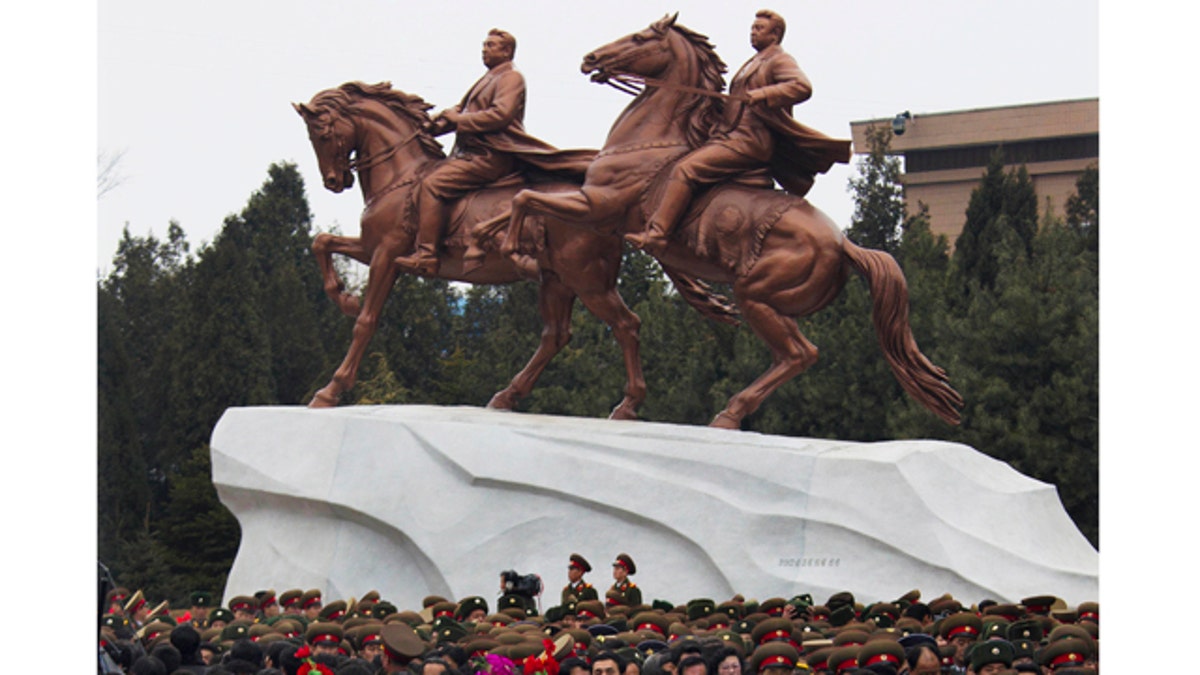
Feb. 14,2012- North Koreans leave the grounds of the Mansudae Art Studio in Pyongyang after watching the unveiling of a new bronze statue depicting the late leader Kim Jong Il and his father Kim Il Sung. As North Koreans prepare for what would have been the 70th birthday of late leader Kim Jong Il this week, the country's state media have gone to great lengths to build up the man who led the nation for 17 years until his death in December. (AP)
PYONGYANG, North Korea -- Coat flying open, reins in hand, Kim Jong Il is depicted astride a galloping horse in a larger-than-life statue unveiled Tuesday as part of birthday celebrations for the late North Korean leader.
The statue is the first bronze casting of Kim, who during his lifetime shunned proposals to erect a bronze like the massive statue of his father, North Korea founder Kim Il Sung, that towers over downtown Pyongyang. Kim Jong Il, who would have turned 70 on Thursday, died of a heart attack in December.
Kim Jong Il told officials in 1999 that he wasn't ready to accept such adulation while his promise of building an affluent society in the nation of 24 million remained unfulfilled, according to excerpts from a speech published last month. During Kim's reign, the country suffered from a famine that killed hundreds of thousands of North Koreans.
In a posthumous compromise, artisans from the Mansudae Art Studio depicted the Kims riding side by side on horseback for Pyongyang's first public sculpture of the late leader. But artisans told The Associated Press that a towering bronze of Kim Jong Il is in the works and will take its place on Mansu Hill.
Tuesday's widely anticipated unveiling of the 18-foot-tall (5.7 meters) statue took place amid a fervent propaganda campaign to build up the man who led the nation for 17 years as his son and successor, Kim Jong Un, takes over the country's helm.
Kim Jong Il postage stamps, commemorative coins and gold medals have been rushed into production in the weeks before the birthday newly dubbed "Day of the Shining Star." Slogans have been carved on the sides of mountains in honor of his birthday, and a new song composed in his honor.
State media has reported a series of supernatural events: Mountains glow crimson, double rainbows, a family of bears weeps by the side of a road, hundreds of shrieking magpies hover over mourning sites.
"Having Kim Jong Un's father and grandfather portrayed as gods is important for a regime based on hereditary rule," said Peter Beck, a Korea specialist and The Asia Foundation's representative in Seoul, South Korea. "Legitimacy comes from his forefathers. Kim Jong Un's father and grandfather may be dead, but he embodies their essence."
Calling himself the "inheritor" of his father's cause, Kim Jong Il was said to have avoided the kind of veneration he ordered for Kim Il Sung, even as he ruled North Korea with an iron fist.
"Some time ago the Party History Institute submitted to me a suggestion that my statue be built marking my 60th birthday," he reportedly told top Workers' Party officials in 1999. "After going over the document, I wrote on it 'Permission Not Granted,' and sent it down."
Kim's era included some of the country's toughest periods, including a famine in the 1990s that killed hundreds of thousands of people and protracted tensions over the nation's drive to build nuclear weapons. Despite a decade of warming ties with South Korea during his rule, relations with Seoul are now at their lowest point in years and the peninsula remains in a technical state of war.
"I cannot have my statue set up on the excuse of my 60th birthday when I have still many important tasks to do, like those of economic construction, improving people's standard of living and reunifying our country," he said, according to excerpts published in the Pyongyang Times last month.
However, he left the matter of a statue to party officials, ordering them to "correctly understand" his desires and dilemma.
Son Kim Jong Un initiated the project two months ago to build the statue of the late leader, said Ro Ik Hwa, a sculptor from the Mansudae Art Studio.
"So far, there has not been any example of making a giant horse-riding statue like this within two months," he told AP. "We sculptors worked day and night to complete it, showing the loyalty of our people."
Kim Jong Un was not at the ceremony attended by the rest of North Korea's core military and political leadership.
The ceremonial head of state, President of the Presidium of the Supreme People's Assembly Kim Yong Nam, praised Kim Jong Il for "applying his unique 'military first' policy to turn our country into an invincible one that can never be defeated and has a nuclear deterrent in the face of the deadly pressing offensive of imperialists."
The unveiling of the statue is the marquee event of birthday commemorations in a nation that remains in a semiofficial state of mourning for the man often referred to as "our fatherly general."
Workers fanned out across the capital city to decorate streets with flowers and North Korean flags. They pounded at frozen flower beds with picks, making space to plant row after row of bouquets made of fabric.
No big military parades are expected at Kim Il Sung Square, the city's main plaza, but two birthday fixtures are going ahead as planned: the annual exhibition of his namesake red "kimjongilia" begonias and an international figure skating competition that traditionally draws Russian and Chinese stars.
Some 30,000 bright red kimjongilia begonias filled an exhibition hall that opened in his honor Tuesday.








































